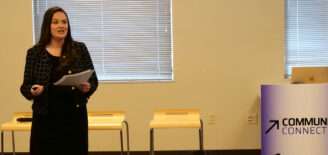The Value of Mentoring: Insights from Eric Stanley, Founder & CEO of M2N
By Eric Stanley, Founder and CEO of the Minority Moves Network.
As we celebrate National Mentoring Day on October 27, it’s a great time to reflect on the profound impact mentoring can have on both individuals and organizations. As the Founder and CEO of M2N, I’ve seen firsthand how transformative mentorship can be throughout my career. Today, I want to share my perspective on the value of mentoring and how it shapes our professional journeys.
Beyond Transactions
At its core, mentoring is about building human connection. When entering a mentoring relationship, it’s important to minimize its transactional nature and focus on the personal bond that forms. In my experience, the most meaningful mentoring relationships are those where both parties are deeply invested in each other’s success. This mutual commitment fosters trust and respect, which can lay the foundation for long-term personal and professional growth.
Choosing the Right Relationships
Selecting the right mentoring relationship is crucial, whether you’re a mentor or a mentee. To make the most of the experience, consider three key factors:
- Aligned Personal Values: Sharing similar values creates common ground, making it easier to foster understanding and mutual respect.
- Stakeholder Ownership: Both mentor and mentee should feel a sense of ownership in the relationship and its outcomes.
- Vested Interest in Mutual Success: The best mentoring relationships are built on genuine investment in each other’s progress and accomplishments.
Prioritizing these factors will lead to mentoring relationships that aren’t just productive, but also deeply rewarding.
Vulnerability: The Key to Meaningful Mentorship
For any mentoring relationship to truly thrive, both mentees and mentors need to embrace vulnerability. This means being willing to admit when you don’t have all the answers, share failures alongside successes, and be open to new ideas and perspectives. When we let our guard down, we open the door to the kind of honest dialogue and feedback that leads to real growth and development. Vulnerability transforms mentoring from a surface-level interaction into a space for profound learning.
The Power of Reciprocal Mentorship
One of the most powerful forms of mentoring I’ve experienced is reciprocal mentorship, where both parties switch between mentor and mentee roles. As a mentor, my mentees often remind me of things I’ve forgotten about myself or inspire me with fresh energy. They make me reflect on aspects of my journey that may have faded into the background. At the same time, as a mentee, I’ve introduced my mentors to new technologies and techniques, keeping them learning and engaged. This mutual exchange of knowledge keeps the relationship dynamic and enriching for both sides.
Personal Mentorship Journeys
Throughout my career, I’ve been blessed with many influential mentors who have shaped my path. Let me share three examples that showcase the various forms mentorship can take:
- Kathy Jordan: One of my first sales at Northwestern Mutual, Kathy was more than just a client. Her guidance and support early on played a pivotal role in building my confidence and sharpening my skills. This relationship shows how mentorship can sometimes come from unexpected places, and that every interaction has the potential to be a learning opportunity.
- Shaun Hawkins: During my time selling corporate board software, Shaun was one of the few people who I met that looked like me, and his mentorship offered me a sense of belonging in an industry where I often felt out of place. Shaun’s mentorship highlights how seeing someone succeed with a shared lived experience can help you navigate the complexities of the workplace.
- Robert Reed: My connection with Robert stands as proof of how true mentorship can evolve over time. Our paths have continued to cross throughout my career, and now we find ourselves intimately aligned through the building of MPower. This progression from mentor to collaborator shows how mentoring relationships can grow into enduring partnerships that drive mutual success.
Conclusion
In celebration of National Mentoring Day, I encourage everyone to think about the mentors who’ve shaped their journey and consider how they might pay it forward. Whether you’re a seasoned professional or just starting out, there’s always something to learn—and something to teach. Mentoring is about more than just professional development; it’s about forming connections, fostering growth, and creating positive change that extends far beyond our individual careers.




